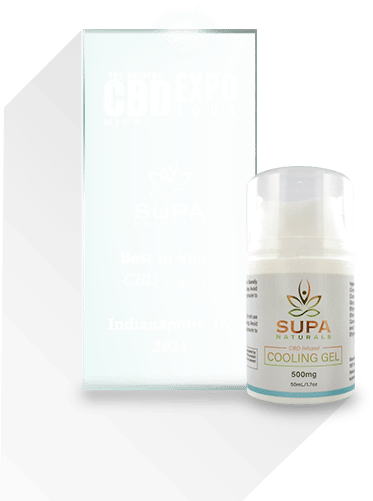CBG vs CBD: What’s the Difference?
CBD oil is growing in popularity, but what about its counterpart, CBG (cannabigerol)? While you will not find nearly as many human trials about CBG as CBD, we know a significant amount about this substance through preliminary research.
Scientists are learning more about CBG’s effects on the body. You may be wondering, “What’s the difference between CBG and CBD? Which of these two cannabinoids are best for me?”
Below, we break down the differences between CBG and CBD and their health benefits and discuss which one is best for you.
What Is CBD?
Cannabidiol, also known as CBD, derives from the cannabis plant, usually from those varieties known as hemp plants. CBD comes in various forms: isolate, full-spectrum, and broad-spectrum. Manufacturers can isolate hemp-derived CBD to purify it and remove all other cannabis plant compounds. This type of CBD is non-intoxicating and non-addictive.
Broad-spectrum CBD includes many other compounds from younger cannabis plants but not THC. In contrast, full-spectrum CBD includes trace amounts (less than 0.3%) of THC along with other cannabinoid compounds that can work in synergy to create positive therapeutic effects on the body.
People commonly use this substance for pain or anti-anxiety and depression purposes. You can even purchase CBD for your pets!
Scientists isolated pure CBD from hemp for the first time in the late 1930s; however, they did little further research on this subject until the 1960s and 1970s. Today, preclinical studies on CBD are increasing worldwide, and scientific and medical research are discovering its benefits.
This natural substance cannot get you high. Instead, CBD affects the body’s endocannabinoid system (ECS) by working with CB2 cannabinoid receptors. Many therapeutic benefits include:
- epilepsy treatment in children
- anxiety and depression alleviation
- inflammation reduction
- appetite stimulation to restore normal food intake
Research also shows that it helps with muscular, immune, and neurological systems, to name a few.
While people often opt for either THC or CBD alone, research suggests that taking them together with other non-intoxicating cannabinoids (as full-spectrum products) can be more beneficial. Combining THC, CBD, and other compounds creates a more therapeutic reaction than taking them separately. Researchers call this the entourage effect.
CBD oil’s rise to fame is due to its notable health benefits, especially with appetite stimulation, wellness, and skincare products. As of 2018, cannabidiol (CBD) is no longer a Schedule 1 substance under federal classification, making it legal in all 50 states. The demand for broad-spectrum CBD oils is continuously increasing in various markets, such as skin and hair care, therapies, and makeup. You can also purchase CBD oil from pharmacies or hemp shops across America. Note that while it’s legal as a topical compound, ingestible CBD is still in the preclinical stage and is not legal in every state.
The hemp plant is also making strides in the nation’s food markets, with products such as milk, granola bars, baked goods, and more containing hemp. You are likely to find hemp products at relatively common locations in your area—for example, you can probably find hemp products at your local grocery store.
The Formation of CBG in Cannabis Plants

CBG and CBD are two cannabinoids that derive from cannabis plants. What sets CBG apart, though? Let’s break it down.
CBG is the primary compound of all other cannabinoids. When the cannabis plant matures, enzymes break down the acidic form of CBG into three minor cannabinoids:
- THC-A (tetrahydrocannabinolic acid)
- CBD-A (cannabidiolic acid)
- CBC-A (cannabichromenic acid)
This process leaves behind cannabigerolic acid (CBG-A), which converts into CBG via decarboxylation. Cannabidiolic acid is the precursor to CBD.
After cannabigerolic acid goes through decarboxylation, very little CBG remains in the hemp plant. Because less CBG exists after this process, there is no abundance of it to research the substance.
Here are some of the properties of CBG products:
- Derives from hemp strains
- Binds with cannabinoid receptors/endocannabinoid system in the body
- Presents no psychoactive properties
- Easily converts to other substances
- Exists only in the early stages of hemp’s growth cycle
- Why Is CBG Hard to Extract from the Cannabis Plant?
CBG products are gaining momentum in research due to the evidence that it has similar therapeutic benefits as CBD. If that is the case, why isn’t it as popular as CBD?
The biggest hindrance to CBG extraction is cost. It is more expensive to produce than its CBD counterpart, which is why CBD products are cheaper and more easily accessible. Why are CBG oils more expensive, though?
Creating isolated amounts of pure CBG oil requires a lot of work. To extract CBG isolate, thousands of pounds of hemp are needed to make even small parcels of CBG. This work is very tedious due to the minute amounts of purified CBG that the decarboxylation process produces.
For example, cannabis strains nowadays contain about 20% CBD. Let’s say the same crop contains 1% CBG. It will take 20 crops containing 1% CBG to produce the same amount of CBD that one harvest produces. You must conduct the same process 20 times to get the same amount of CBG. This disparity between CBG and CBD is why CBD sees more research and production.
The maturity of the hemp plant poses another problem. The more a hemp plant reaches peak maturity, the lower the chances of CBG or CBG-A converting into other forms of cannabinoids. Therefore, hemp cultivators have two options. They can either harvest the hemp before it gets too mature (with the intention of only producing CBG) or grow the hemp to full maturity to make CBD.
When producing CBG, a detailed process for extraction increases costs. Special equipment, called chromatography apparatuses, isolates the CBG from hemp plants. Using this equipment is necessary for CBG production, as it is responsible for isolating and purifying the substance for consumers.
This technique targets explicitly raw hemp or cannabis, which can be tricky and costly in and of itself due to the precision that this process requires. Wasting raw hemp or cannabis can squander time, money, and resources that are hard to come by for this process.
Chromatography apparatuses are already expensive, as manufacturers typically pay for high-performance equipment upfront. Also, adapting these tools that are not standard for most farmers can be costly.
Since production costs and time are constraining factors, scientists struggle to gather hefty amounts of CBG. Thus, doing the proper research and verifying the efficacy of CBG usage in the United States is quite difficult. Unlike the abundance of CBD, which undergoes plenty of research, CBG does not have as many in-depth preclinical studies to support biological findings and health benefits.
Preliminary research shows improved health and wellness through the use of CBG. However, farmers and manufacturers do not currently produce enough CBG for nationwide consumption. This lack of supply is due to the exorbitant amount of time and money that extracting this substance requires.
CBG vs CBD: What Are the Health Benefits?

Now that we understand the differences between CBD and CBG, let’s discuss some key benefits to these substances. Recent scientific research provides evidence that shows many health and wellness benefits that both CBG and CBD offer.
CBG
Even with minimal research, CBG is definitely getting attention and displaying evidence of therapeutic benefits. A significant advantage that CBG exhibits over CBD is the interaction of cannabinoid receptors in the brain. CBD shows low reactivity to these receptors and instead works with the endocannabinoid system indirectly. However, CBG works directly with CB1 and CB2 receptors in the brain.
CBG is also a great way to reduce psychoactive responses to THC, like paranoia and hallucinations. Those who prefer a combination of these substances can receive more benefits than if they took CBG and THC separately.
- Similar to CBD, CBG also exhibits therapeutic qualities. Although research is limited for CBG, evidence supports many health and wellness benefits, such as:
- Killing antibiotic-resistant bacteria: For example, CBG can combat MRSA
- Treating eye issues: CBG’s therapeutic properties involve neuroprotective and vasodilator effects
Lowering inflammatory responses: Through neurological effects, CBG can reduce inflammation, as seen in animal research on IBS (inflammatory bowel disease)
Treating neurological issues: Neuroprotective properties can positively affect people with neurological conditions by decreasing inflammation and calming the nervous system
Other effects include appetite stimulation and combating cancer and tumor growth. Many of these benefits are attributable to CBG’s ability to reduce inflammation, which is a critical factor in pain responses and neurological issues in the body. Be on the lookout for further research about CBG and how it can potentially help you.
CBD
While CBG reacts more to the CB1 and CB2 receptors in the brain, CBD still responds quite well to them. Both receptors are part of the body’s peripheral nervous system (PNS). This system interacts with many parts of our bodies, such as the skin, muscles, limbs, and immune system. Thus, CBD can significantly impact many different organ systems.
The most common reason why people gravitate towards CBD is for pain management and reduction. This consumer reaction is a big step into the world of holistic approaches to treat ailments, which will eventually increase the demand for CBD products. For many, these products are an excellent alternative to prescription drugs, to which people can become addicted.
CBD can help in many different areas, such as:
Pain: By interacting with endocannabinoid receptors, CBD can limit inflammation due to lowered neurotransmitter activity. This cannabinoid’s molecular structure enhances its analgesic properties when interacting with the human body, providing relief from pain.
Depression and anxiety: CBD represents a natural way to lower anxiety and depression by suppressing these neurotransmitter activities and offering anti-depressant effects. This non-intoxicating cannabinoid can also restore impaired cognitive function.
Neurological issues: CBD helps by interacting with endocannabinoid receptors for pain and inflammation reduction, which are common in neurological disorders like MS, fibromyalgia, etc.
Acne: Using CBD oil or cream is beneficial for anti-inflammatory properties, which help reduce acne.
Heart health: CBD can lower blood pressure by reducing anxiety, and it is associated with antioxidants that reduce stress.
Cancer: CBD can help reduce the side effects of cancer that those undergoing chemo or radiation commonly experience, like vomiting, nausea, and pain.
Other helpful benefits include reducing psychotic effects by reducing patients’ symptoms, such as in schizophrenia. CBD is also helpful for the treatment of diabetes and substance abuse.
Since CBD is now widely accessible, those who suffer from psychiatric disorders and rely on medicine see this substance as a game-changer. The use of CBD significantly reduces the symptoms associated with certain disorders, like schizophrenia.
While these products do not cure ailments, diseases, or cancers, evidence supports that CBG and CBD can ease the symptoms associated with these issues. Consult with your doctor before taking medical cannabis, especially if you are taking anticancer medications, blood pressure medications, antiepileptic drugs, or other prescription medications.
Both CBG and CBD are available in a variety of products. Across the nation, these two cannabinoids are available as edibles, oils, foods, gummies, and even pet products are flying off the shelves. They also come in different spectrums and contain different levels of CBD or CBG, depending on the products you purchase.
Keep an eye out for price changes in CBD. Most of the time, you can expect the same price trends between the two products in the hemp market.
CBG vs CBD: Which One Is Better

Both CBG and CBD have tremendous qualities that can improve mental and physical health, so you may wonder, “Which one is better?”
Sometimes, research suggests that one product is better than the other, but that research is missing an essential element: you! Deciding what substances are best depends on the person using them. What reacts well with your body? What substances interact well with each other or have minimal effects?
These naturally occurring substances will interact differently based on your:
- lifestyle
- heredity
- mental health
- physical characteristics
Take these into account when figuring out the best solution for you. Remember, using both CBD and CBG together can sometimes provide even more benefits.
Because CBG research is limited and you might not be able to find a company that sells it in your area, CBD might be your best bet, accessibility-wise.
Remember to find what works well for your body. You may never truly know what is best until you try several different options. Both products, CBD and CBG, offer numerous benefits, so you will still experience favorable health effects no matter your decision. If you are still uncertain about what would be best for you, talk with a trusted physician about your options.
Are You Interested in CBD?
Here at Supa Naturals of Issaquah, WA, we understand the value of your journey to better health. Our mission is to provide high-quality and potent CBD products that are non-GMO and made organically.
Supa Naturals strives to provide healthy and effective CBD products for you and your pets. Our cGMP-compliant production facility has a team of expert chemists that verify our hemp products and ensure maximum potency and safety.
Our products include tinctures, edibles, capsules, topicals, specialty pet products, and more. For more information, please email us at [email protected] or send us a message online.
CBG vs CBD: Frequently Asked Questions
Frequently Asked Questions
CBG has a ton of therapeutic benefits. CBG can help reduce the psychoactive responses that many people have to THC. The molecular structure of CBG oil also has use in medical scenarios to kill antibiotic-resistant bacteria, treat eye issues, lower inflammation, and help with bladder dysfunctions.
According to Biochemical Pharmacology vol. 85,9 (2013), evidence from clinical trials suggests that CBG extracts might provide relief to patients suffering from experimental inflammatory bowel disease. The cannabinoid can also aid in the treatment of Huntington’s Disease and bladder contractility issues.






